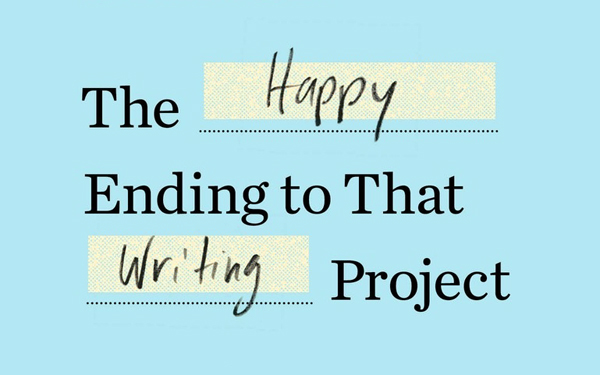It’s been said by a certain British nanny named Mary Poppins that a job well begun is a job half done. Or maybe it was Aristotle.
But anyone with a drawer (or laptop) full of partial outlines, treatments, screenplays and TV pilots knows better, whether they are uncompleted as the result of an early slump that came from having too many options, or in the closing moments when there weren’t options enough.
 Cary Tennis and Danelle Morton’s new book Finishing School aims to help with getting those projects finished. Based on their workshops of the same name, their process focuses on setting goals, establishing timetables, and working with others to hold one another accountable.
Cary Tennis and Danelle Morton’s new book Finishing School aims to help with getting those projects finished. Based on their workshops of the same name, their process focuses on setting goals, establishing timetables, and working with others to hold one another accountable.
The first section of the book lays out “six emotional pitfalls” that creative people inadvertently set up for themselves. These include Doubt – the nagging conviction that you’re a terrible writer and pessimism about selling the project; Arrogance, an unwillingness to be evaluated as anything less than perfect; and Shame, from being too ashamed to finish to shame of not finishing.
The book then explores highly-specific examples of how their process can apply to a wide variety of projects, and so is one part psychology lesson and two parts practical manual.
Cary Tennis and Danelle Morton recently spoke with Creative Screenwriting about Finishing School. And with the same wit that makes their book such an enjoyable read, they reveal why we have such a hard time finishing things, how that trip to the office supply store is a mixed blessing, and the trouble with claiming that “Actually, it’s a trilogy.”
[The following has been condensed and edited from separately conducted interviews.]

Cary Tennis and Danelle Morton
What is Finishing School, and how can it help writers?
Danelle Morton: Finishing School is a discipline that makes your work something that you schedule. You try not to feel, is it good? Is it bad? Am I good? You just work on the simple act of finishing. You estimate your time accurately, and you choose a task to do in that time.
Cary Tennis: I realized that the workshop method I was using when teaching, based on the Amherst Writers and Artists method, was unlocking a lot of imagination and emotion and memory, but wasn’t motivating people to finish their work and bring it to market.
So I created this workshop where people come and look at a calendar, identify available time to work on their projects, specify what part of their projects they want to finish in a month’s time, and what they can finish in one week.
During the week you have a creative buddy you check in with. Before and after you do your work, you say, “It’s 10am, I’m starting in and I’m going to work for three hours.” This provides a clarity and structure that many of us who are intuitive, impulsive creative types don’t really come by all that naturally.
Why do we all have a harder time finishing something than starting?
Danelle: Because you’re looking at the wrong place. All the practical parts of being a writer, the getting stuff done, the getting your work out, all that stuff that we have to wrestle with eventually – the fears about that can get in the way of finishing. You’re not looking at the work itself to keep yourself motivated.
People come to our Finishing School class, and they know right away if the discipline’s not valuable to them, because they’re not serious about finishing. So it clears away the bullshit.

Nicholas Cage as Charlie Kaufman in Adaptation
It seems that traditional writer’s groups evaluate the work, and Finishing School measures progress.
Cary: That’s part of the problem solving we do; we don’t really get into the content.
Danelle: And discipline, which is incredibly important to anything, but particularly in writing because it is so emotional. You are looking at things that are very tough to look at, and you do want to look away.
Most guides focus on the emotions of characters in a script, but yours takes into account the emotions of the writers themselves.
Danelle: We all have them. As we explore in the book, you are reckoning with your biggest fears: shame, fear, judgment, arrogance; this useless chanting of, “I’m a terrible writer, and I’ll never do this, and I’m a miserable failure, and everything I do is wrong.” All that stuff that happens when you’re supposed to sit with your thoughts. That loses its sting if you’re making progress
An interesting aspect of your book involves shame, the feeling of fraud when identifying yourself as a writer.
Danelle: Nobody can take the identity of writer away from you if you’re working!
One of my favorite sections is entitled, “Actually it’s a trilogy”. That it is the last thing you want to hear from an aspiring writer, especially someone who hasn’t even started yet!
Danelle: It seems grandiose and kind of comical to automatically assume that this story that you’ve done has that kind of length; that it’s deserving of 1,000 pages. It’s amazing what people like J.R.R. Tolkien or J.K. Rowling have done. But the mind that can pull it off is very rare.

The Lord of the Rings, by J.R.R. Tolkien
You mention an example of a wide-eyed aspiring novelist with so much focus on trying to create a vast world that it became impossible to write even the first sentence.
Danelle: Absolutely. That’s the problem that the guy was having. He’d have this burst of grandiosity, and then nothing could be big enough to justify the effort. Where are the points of greatest drama, and the greatest action? If you’re writing a trilogy you’re asking a lot of yourself. You have to write one book. You have to write one sentence.
Another interesting section covers the classic trip to the office supply store. Some might say it’s a good thing to get out of your chair and jog your body and mind, that it leads to inspiration.
Cary: Well…it might [laughs]. What I’m talking about is getting false satisfaction from a symbolic activity. You might say, “well I now have a lot of file folders,” but your writing isn’t any farther along.
Now, somebody might say, “I wanted to write but my place is a wreck and not conducive to writing”. OK, maybe that’s a thing to address in Finishing School. We would say, “why don’t you schedule some time for this?” It shouldn’t use up time scheduled for writing.
Danelle: The difference is recognising impulsive, distractive behavior. As in, “this week of Finishing School, I’ve got three hours, I’m going to set up my office.” As opposed to, “I’m going to sit down and write, oh shit, I don’t know what to do. Oh wait, maybe I’ll go to the office supply store.”
Cary, you seem to be a dreamer, uncomfortable with structured time and commitments, while Danelle, you strongly adhere to your to-do list. How did you reconcile your different approaches for the book?
Cary: Danelle and I are amazed at each other because we’re so different. She looked at me like I was from outer space when I said to her, “You do what? You make a list every morning?”
Danelle: We’re on opposite ends of the spectrum. But I took his class and I found it very useful. And I kept thinking that if it was truthful for someone like me, just think about all the people who are not as focused as me who could really benefit from this simple discipline. So we decided to do this book together.
Cary: It’s a method that allows for widely varying people to all make progress. If you’re a person like me, who breaks out into a sweat at the idea of a making a mark on a calendar that commits to a time, it’s useful.

With these differences, how on earth did you manage to work together to pull this book off?
Danelle: We divided up the territory, like I’ll do this one, you’ll do that one. We assigned tasks to each other, we called each other, and supported each other. And we made it.
So in a way, the very existence of the book is proof the system works: you used Finishing School to finish Finishing School.
Cary: That’s right!
Before You Go
[addtoany]

